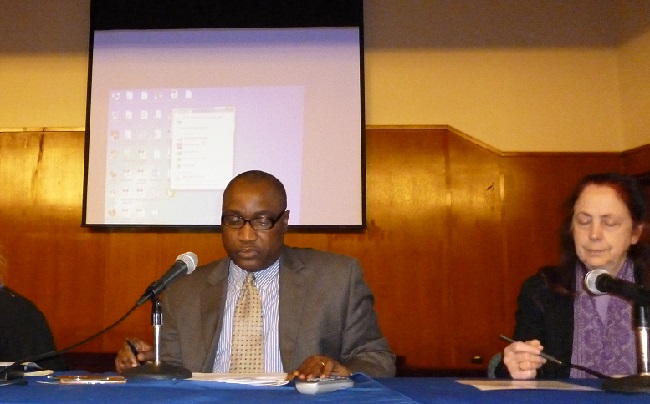Protect elderly women from gender-based violence

Mr. Slewion says thousands of older women are dehumanized in some African countries because of witchcraft allegations
Many older women in Africa continue to be victims of gender-based violence despite the gains made by the international community to protect the rights of women and improve their socioeconomic and political conditions, says Sam Slewion, a social justice activist and Representative for Liberia for the International Network for the Prevention of Elder Abuse(INPEA).
Mr. Slewion made the observation on Wednesday, March 11, in New York, USA, as Representative of INPEA , which is based in Washington, DC, USA, when he served as one of the panelists at a forum at the UN Commission on the Status of Women Session 59 as part of activities in observance of International Women’s Day. The forum was held under the theme: “Witchcraft Accusations-Violence & Torture-Women and Children.”
Mr. Slewion told the gathering, comprising mostly women, that while women rights activists and civil society organizations are basking in the euphoria of celebrating the gains made to improve the lives of women within the context of social, economic, political and education mobility, it is disheartening that there still exists practice of witchcraft accusations in many African countries that are oppressive and dehumanizing to women, especially older women and children.
Mr. Slewion, who is also Associate Professor and Chairman of the Social Work Department of the United Methodist University in Liberia, said while the international community can credit itself for adopting some conventions and proclamations for the protection of women, the world continues to witness millions of women, including older women, being subjected to gender-based violence, including witchcraft accusations against older women who are sometimes murdered or ostracized by their communities once accused of witchcraft.
He said in some African countries, including Ghana and Nigeria, over 1000 older women and children alleged to be involved with witchcraft practices are forced to live in “witch camps” designated by their local governments to isolate them from their communities. “The conditions of the so called Witch Camps are inhumane and lack access to basic facilities and education for the children,” Mr. Slewion noted.
He said the victims of this continued witchcraft accusations seem to share similar profile despite which country they reside. “They are usually older women, poor (low economic status), widowed, childless, illiterate, do not have any male protector-son, husband, brother, and disabled and they live in rural communities,” he intimated.
Mr. Slewion, who is also consultant to the Coalition of Caregivers and Advocates for the Elderly in Liberia (COCAEL), then described the drivers of this continued use of violence against older women under the disguised of witchcraft accusations as the lack of a specific UN Convention to protect older people, the use of images in films and documentaries portraying older women as witchcrafts, most especially by African film producers and the lack of political will and rule of law in many African countries to hold accountable those perpetrating such violence which is orchestrated mainly by men.
Mr. Slewion acknowledged that many governments have made progress by abolishing practices that use “mob justice” and “voodoo justice” to punish older women and older men accused of witchcraft without any due process, but noted “we still have a long way to go to stop this uncivilized behavior outside of the rule of law because older women and children are still being accused of witchcraft and victimized.”
He, therefore, called on the United Nations to listen to the “global voices” being led by the Global Alliance for the Rights of Older People (GAROP), urging that body to adopt a UN Convention for the protection of older people globally.
“We have a moral responsibility to ensure that all women live their lives without fear and this can be manifested through the adoption of a specific UN Convention that protects older people, especially older women no matter which continent they live,” Mr. Slewion passionately appeal to the international body.
He also reminded governments everywhere, especially in Africa, to protect the lives and rights of every citizen equally under the rule of law. ” We the members of the civil society community must also not relent in our advocacy for policies and instrument that protect every person irrespective of their ethnicity, age, gender, religious affiliations, sexual orientation and political persuasion as well as their geographical location.”

